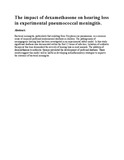The impact of dexamethasone on hearing loss in experimental pneumococcal meningitis.
| dc.contributor.author | Bhatt, SM | |
| dc.contributor.author | Cabellos, C, | |
| dc.contributor.author | Nadol, JB Jr, | |
| dc.contributor.author | Halpin, C | |
| dc.contributor.author | Lauretano, A | |
| dc.contributor.author | Xu, WZ | |
| dc.contributor.author | Tuomanen, E | |
| dc.date.accessioned | 2013-04-29T10:36:35Z | |
| dc.date.available | 2013-04-29T10:36:35Z | |
| dc.date.issued | 1995 | |
| dc.identifier.citation | Pediatr Infect Dis J. 1995 Feb;14(2):93-6 | en |
| dc.identifier.uri | http://erepository.uonbi.ac.ke:8080/xmlui/handle/123456789/17633 | |
| dc.description.abstract | Bacterial meningitis, particularly that resulting from Streptococcus pneumoniae, is a common cause of acquired profound sensorineural deafness in children. The pathogenesis of meningogenic hearing loss has been investigated in an experimental rabbit model. In this study significant deafness was documented within the first 15 hours of infection. Initiation of antibiotic therapy at this time diminished the severity of hearing loss in most animals. The addition of dexamethasone to antibiotic therapy prevented the development of profound deafness. These results suggest this model will be useful in developing antiinflammatory strategies to improve the outcome of bacterial meningitis. | en |
| dc.language.iso | en | en |
| dc.title | The impact of dexamethasone on hearing loss in experimental pneumococcal meningitis. | en |
| dc.type | Article | en |
Files in this item
This item appears in the following Collection(s)
-
Faculty of Health Sciences (FHS) [10378]

